By reading we can transport ourselves to another reality, feel part of other struggles, it is an open door to action and mobilization in favor of a more just world. In this time of pandemic, reading allows us once again to live experiences impossible to experience otherwise, at a time when much of the activism is relegated to the digital sphere. On this book day, why not using reading to question the system? We bring you some interesting book proposals from our team, to make us reflect on how to continue defending and realizing our human rights. We wish you a good book day!
1)The Divide, by Jason Hickel.
Our first proposal is this book: The Divide, a work that questions the mantra that has been repeated for decades “the divide between rich countries and poor countries”. This book provides a different understanding of inequality and poverty. It confronts the reader with the impossibility of environmentally sustainable development within the parameters of the current global system and puts forward an optimistic manifesto for change.
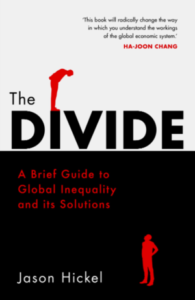
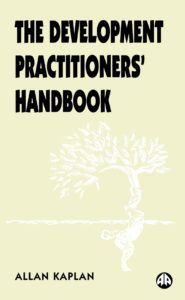
2) The Development Practitioners’ Handbook – Allan Kaplan
Development” is recognized as a major, if not the major, challenge facing us today. However, those who work in development cooperation do so in a field that has become highly contentious. Allan Kaplan looks at development from the point of view of the individual, the organization, the community and society, as well as a living process in its own right, and explains where the development practitioner stands in carrying out his or her work. Allan Kaplan outlines the illusory nature of development itself, in order to deepen and underpin development practice and give it foundation and meaning.
3) Civil Disobedience” by henri Thoreau
Thoreau’s Civil Disobedience was first published in 1849 bit its content remains very relevant today. It argues the need to prioritize one’s conscience over the dictates of laws. Thoreau doubts the effectiveness of reform within the government, and he argues that voting and petitioning for change achieves little. He presents his own experiences as a model for how to relate to an unjust government: In protest of slavery,
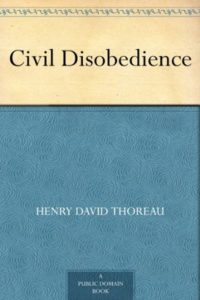
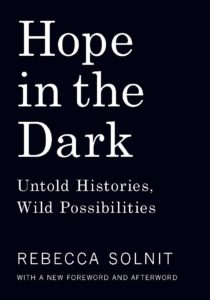
4) Hope in Dark Times, Rebecca Solnit
Why hope? Rebecca Solnit draws on the powerful emotion that grows in the certainty of a dark future and the empowerment of social movements. This book is about activism and the power of people to bring the change for global justice. Rebecca Solnit provides numerous reasons to stay awake in Hope in the Dark, an essay that the author wrote in 2003 and that is as relevant as the first day. Throughout the book, the author explains that even in the darkest moments of the last decades there have been inspiring initiatives that give a glimmer of hope for a better world. As a reminder, Solnit points out that “we are not who we were not so long ago,” and that any social transformation must first occur in the collective imagination. Let’s imagine, and let’s conquer.
5) Pedagogy of the Oppressed – Paulo Freire
First published in Portuguese in 1968, Pedagogy of the Oppressed was dedicated to “the oppressed, and to those who suffer with them and fight at their side” . The book was translated and published in English in 1970. Pedagogy of the Oppressed is based on Freire’s lived experiences of oppression and how he translated such a reality into a pedagogy that would emancipate the oppressed into becoming more aware of themselves as Persons within a particular historical context and be empowered to become agents of social change.
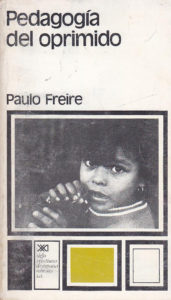

6) City of Walls by Teresa P. Caldeira
Teresa Caldeira’s pioneering study of fear, crime, and segregation in São Paulo poses essential questions about citizenship and urban change in contemporary democratic societies. This analysis of the dynamics of urban fear focuses in São Paulo, and uses comparative data on Los Angeles. The writer identifies new patterns of segregation developing in these cities and suggests that these patterns are appearing in many metropolises.
7) We Should All Be Feminists (2014), by Chimamanda NGozie Adichie
We Should All Be Feminists is a personal, eloquently-argued essay from Chimamanda Ngozi Adichie. Here Adichie offers readers a unique definition of feminism for the twenty-first century, one rooted in inclusion and awareness. Drawing extensively on her own experiences and her deep understanding of the often-masked realities of sexual politics, here is one remarkable author’s exploration of what it means to be a woman now—and an of-the-moment rallying cry for why we should all be feminists.
We Should All Be Feminists
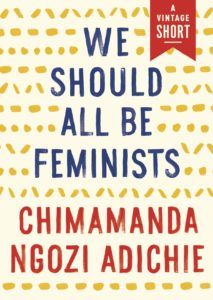
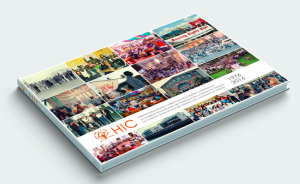
8) HIC and the Habitat Conferences
Among the many advantages of being part of a global Coalition like HIC is that the inspiration from local human rights struggles is immense, diverse, and inspiring.
To make a book of all those experiences would be an enormous work, and so was this book of the 40 years of our Coalition’s Memories. This book brings together the memory of 40 years of local and global struggles and HIC’s experiences throughout the process of the Habitat Conferences.
And you, do you have any literary recommendations for global justice on this Book Day?